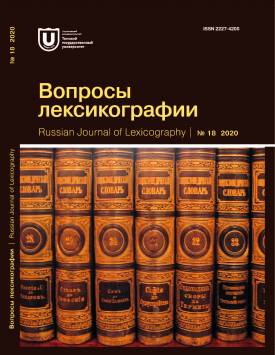A Systemic Description of Conjunctions in an Explanatory Dictionary: Main Problems and Their Solutions
The article considers the problems of the systemic principle implementation in the Dictionary of the 21st-Century Russian Language (compiled under the guidance of Doctor of Philology, Professor Galina N. Sklyarevskaya at the Herzen State Pedagogical University of Russia). According to this principle, words connected by different types of relations in the lexical system must be described in parallel to correlate definitions to each other. Therefore, the dictionary has been compiled not from word to word in alphabetical order, but by combining words in lexical groups and word families, then describing words belonging to one lexical group or word family, and then arranging the finished entries alphabetically. The main difficulties of applying the systemic principle arise because of the necessity to differentiate the meanings of non-absolute synonyms by finding differential semes, while synonymous conjunctions (as well as other functional parts of speech) are usually distinguished only by subtle semantic and pragmatic properties, and this fact complicates the task of their lexicographical interpretation. The analysis of definitions in the Russian explanatory dictionaries shows that there are several ways to define conjunctions with similar, but not equal meanings: 1) by listing several synonyms (each conjunction is defined by two or more synonymic conjunctions without describing the meaning); 2) by giving identical or similar formal definitions, which indicate only a type of a conjunction or a type of a joined clause or construction; 3) by giving equal descriptive definitions; 4) by giving descriptive definitions that are not identical but at the same time indistinguishable; 5) by giving similar, but not identical descriptive definitions indicating the difference between non-equal meanings. In the author’s opinion, the last way of constructing definitions is optimal for describing conjunctions with similar meanings, but it is applied rarely and inconsistently. The compilers of the Dictionary of the 21st-Century Russian Language have a task to compose definitions this way and not to give the same or similar, but indistinguishable interpretations for different words. As a result of extensive work on dictionary entries, it was decided to use typical short commentaries (indicating intensity, softening, redundancy, a certain speaker’s attitude to the situation, etc.) that should be given at the end of the definitions to show the most subtle semantic and pragmatic differences. Thus, the main feature of the Dictionary of the 21st-Century Russian Language, its main difference from most of the other explanatory dictionaries is that it not only describes lexical and semantic innovations, but also changes the general principle of describing the basic lexicon, in which no such changes have occurred over time. The lexicographical methods of constructing definitions the dictionary uses are traditional, but the dictionary compilers try to apply them more consistently and more systematically.
Keywords
non-absolute synonyms, lexicographic description of conjunctions, interdependence of definitions, lexical system, modern Russian Language, explanatory lexicographyAuthors
| Name | Organization | |
| Tkacheva Irina O. | Herzen State Pedagogical University of Russia | irina-tkach@yandex.ru |
References

A Systemic Description of Conjunctions in an Explanatory Dictionary: Main Problems and Their Solutions | Voprosy leksikografii – Russian Journal of Lexicography. 2020. № 18. DOI: 10.17223/22274200/18/8
